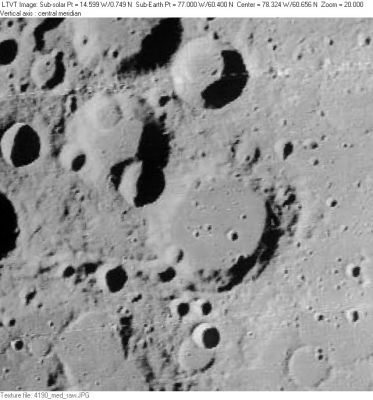Cleostratus
Contents
Cleostratus
|
Lat: 60.4°N, Long: 77.0°W, Diam: 62 km, Depth: 4.04 km, [/R%C3%BCkl%201 Rükl 1], [/Stratigraphy pre-Nectarian] |
Table of Contents
[#Cleostratus Cleostratus]
[#Cleostratus-Images Images]
[#Cleostratus-Maps Maps]
[#Cleostratus-Description Description]
[#Cleostratus-Description: Elger Description: Elger]
[#Cleostratus-Description: Wikipedia Description: Wikipedia]
[#Cleostratus-Additional Information Additional Information]
[#Cleostratus-Nomenclature Nomenclature]
[#Cleostratus-LPOD Articles LPOD Articles]
[#Cleostratus-Bibliography Bibliography]

LO-IV-190M Among the many [/lettered%20crater lettered craters] visible in this view are 21-km Cleostratus E, on the rim at about 10 o'clock; 50-km Cleostratus F beyond that; and 35-km Cleostratus A (at top center). Directly above Cleostratus F, 56-km [/Boole Boole] A is cut in half by the top margin. In the lower left corner of the frame, the northwest floor of 125-km [/Xenophanes Xenophanes] is dimly visible.
Images
LPOD Photo Gallery Lunar Orbiter Images
Maps
([/LAC%20zone LAC zone] 10A1) USGS Digital Atlas PDF
Description
Description: Elger
([/IAU%20Directions IAU Directions]) CLEOSTRATUS.--A small ring-plain, N. of [/Xenophanes Xenophanes], surrounded by a number of similar objects, all too near the limb for observation.
Description: Wikipedia
Additional Information
Depth data from [/Kurt%20Fisher%20crater%20depths Kurt Fisher database]
- Westfall, 2000: 4.04 km
- Viscardy, 1985: 2.4 km
- Cherrington, 1969: 2.19 km
Nomenclature
Cleostratus (ca. 520 BC; possibly 548 BC to 432 BC) was an astronomer of ancient Greece. He is believed by some scholars to have introduced the zodiac (beginning with Aries and Sagittarius) and the solar calendar to Greece from Babylonia.
The valley west-southwest of Cleostratus is unofficially called Vallis Cleostratus by D.Caes.
LPOD Articles
Bibliography
This page has been edited 1 times. The last modification was made by - tychocrater tychocrater on Jun 13, 2009 3:24 pm - afx3u2